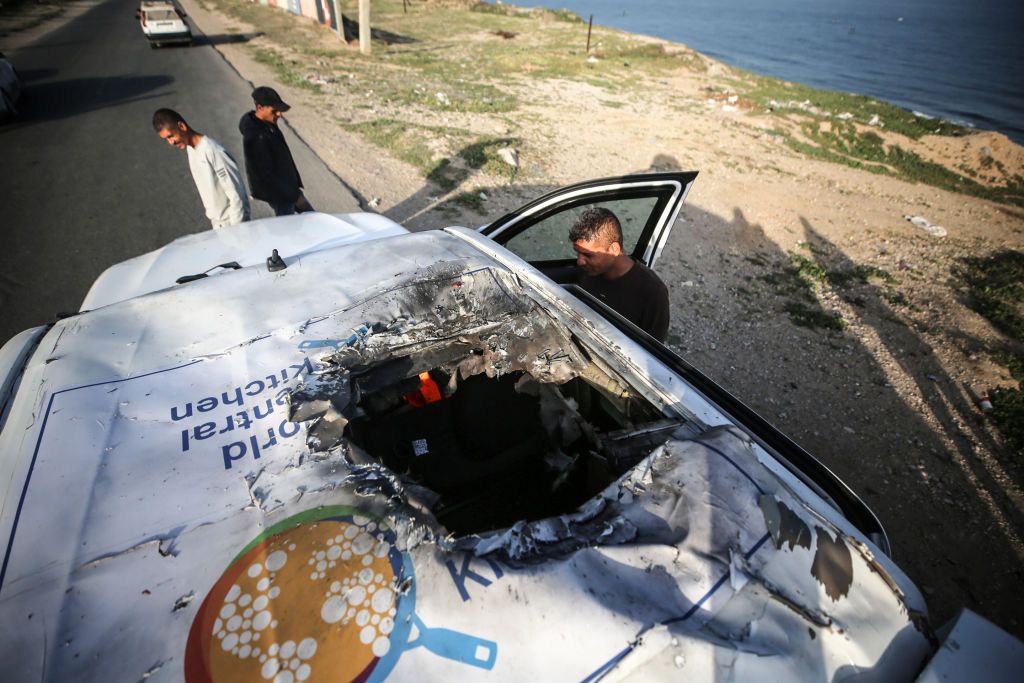Happy Monday! To those of you in the path of today’s solar eclipse, check here for information about when the show starts in your area. As a reminder to no one in particular, be sure not to look at the sun without eye protection!
Quick Hits: Today’s Top Stories
- Tens of thousands of protesters gathered in Tel Aviv and other major Israeli cities on Saturday, calling for elections and a deal to secure the release of the hostages held in Gaza as the country marked six months since Hamas’ October 7 attack over the weekend. On Saturday, the Israel Defense Forces (IDF) recovered the body of Elad Katzir, a 47-year-old farmer taken hostage on October 7. According to IDF intelligence, Katzir was killed in captivity by Islamic Jihad, a terrorist organization allied with Hamas in Gaza. “He could have been saved if there had been a deal in time,” Katzir’s sister claimed, denouncing the Israeli government. “But our leadership are cowards, motivated by political considerations, and thus it did not happen.” An estimated 95 hostages are still alive in Gaza today, as ongoing negotiations to secure their release fail to yield a breakthrough.
- The IDF announced on Sunday the withdrawal of most of its ground troops from southern Gaza after several months of fighting in the Khan Younis area. Israeli military officials suggested the move, which leaves just one brigade in the enclave, was in preparation for operations in the southernmost city of Rafah. “The troops exit and prepare ahead of their follow-up missions,” Israeli Defense Minister Yoav Gallant said yesterday. Meanwhile, Israeli and U.S. officials are on alert for a potential Iranian attack in the wake of the alleged Israeli strike in Damascus, Syria, last week that killed three senior Iranian Islamic Revolutionary Guard Corps (IRGC) commanders and four IRGC officers.
- Two Russian strikes in Kharkiv, Ukraine, killed eight civilians and injured at least 10 others early Saturday morning, regional authorities said. Ukraine’s military indicated that Ukrainian forces had intercepted some but not all of the drones and missiles used in the strike, but Ukrainian President Volodymyr Zelensky said in an interview on Friday that the country is running low on missile defenses. “If they keep hitting [Ukraine] every day the way they have for the last month, we might run out of missiles, and the partners know it,” he said, noting that the military is already having to decide what areas to protect.
- Mexico suspended diplomatic relations with Ecuador on Saturday after Ecuadorian authorities raided the Mexican embassy in Quito, Ecuador, on Friday to arrest Jorge Glas, the former vice president of Ecuador. Glas—who had been convicted on bribery charges in Ecuador and faced prison time—had been staying at the embassy since December and on Friday, the Mexican government granted him asylum, prompting Ecuador’s raid just hours later. United Nations officials and countries throughout the region—including Brazil, Argentina, and Uruguay—condemned Ecuador’s actions as violating diplomatic norms, and Nicaragua joined Mexico in cutting diplomatic ties with Ecuador.
- Populist Peter Pellegrini was elected president of Slovakia over the weekend with 53 percent of the vote. A member of the Hlas (Voice) party and sympathetic to Russia, Pellegrini beat out Ivan Korčok, a former foreign minister and staunch supporter of Ukraine. Though the role of president is largely symbolic, Pellegrini’s victory bolsters Hlas Prime Minister Robert Fico, who leads the government’s ruling coalition and has drawn the country closer to Russia.
- Tens of thousands of people marched in Budapest, Hungary, on Saturday to protest Hungarian Prime Minister Viktor Orbán’s government. Péter Magyar, a former diplomat who was once a senior member of Orbán’s Fidesz party, organized the demonstration and has presented himself as a changemaker with plans to challenge Orbán in upcoming European parliament elections this summer. The rising opposition figure has promised to root out corruption and repair ties with the European Union—of which Hungary is a member—if elected.
- The Bureau of Labor Statistics reported Friday that U.S. employers added 303,000 jobs in March—up from 270,000 in February and far exceeding economists’ expectations. The healthcare and government sectors accounted for 143,000 of the new jobs. The unemployment rate ticked down slightly from 3.9 percent to 3.8 percent, while the labor force participation increased from 62.5 percent in February to 62.7 percent last month. Average hourly earnings—a measure the Federal Reserve is watching closely in its fight against inflation—rose 0.3 percent month-over-month in March, and 4.1 percent year-over-year. Those figures were 0.2 and 4.3 percent in February, respectively.
- A 4.8-magnitude earthquake struck New Jersey on Friday morning, with tremors felt from Baltimore to Boston. The quake caused little damage and resulted in minor transit disruption at some airports throughout the region.
- The South Carolina Gamecocks beat the Iowa Hawkeyes 87-75 on Sunday to win the NCAA Women’s Basketball championship. In her last game as a college player, Iowa’s Caitlin Clark scored 30 points and set a championship record in the first quarter for the most points by a single player in a single period. On the men’s side, the Purdue Boilermakers will face off against the University of Connecticut Huskies for the championship tonight at 9:20 p.m. ET.
Tragic Incident Complicates U.S.-Israel Relations

Around 11 p.m. local time last Monday, seven aid workers employed by World Central Kitchen (WCK)—an NGO that provides food aid in times of disaster and war—set off along a coastal road used to deliver aid in the central part of the Gaza Strip. They’d been part of a convoy transporting 100 tons of food aid that had arrived at a recently built pier to a warehouse in Deir el-Balah. After unloading at the warehouse, they headed south in three SUVs.
By 11:15 p.m., Israeli forces had ordered three drone strikes—in error—that killed all seven workers.
The Israel Defense Forces (IDF) quickly admitted culpability for the strikes, dismissing two officers after an investigation—the results of which it released Friday—showed the soldiers operating the drones fired in violation of the IDF’s standard operating procedures following a misidentification. The aid workers’ tragic deaths also set in motion a chain of events that culminated in dramatic policy change from both the Israeli War Cabinet and the Biden administration, which could potentially open additional avenues for aid to reach civilians in Gaza. The strike also illustrated how difficult it is for humanitarian groups to safely operate during a war that has repeatedly seen Hamas use civilians as human shields.
WCK, founded by celebrity chef José Andrés, has operated in crisis areas around the world since the aftermath of the 2010 Haiti earthquake. Just last month, the group began bringing food aid into Gaza by ship from Cyprus on a jetty it helped construct out of rubble. It was aid from one of those ships that the WCK team was delivering Monday night. On Tuesday, the group formally announced the death of that team—an Australian, three Britons, a U.S. and Canadian dual citizen, a Pole, and a Palestinian driver—and pointed the finger at the IDF, adding that it had paused its activities in Gaza indefinitely.
On Tuesday, the IDF’s chief of staff, Lt. Gen. Herzi Halevi, and Prime Minister Benjamin Netanyahu both confirmed that the IDF had ...
As a non-paying reader, you are receiving a truncated version of The Morning Dispatch. Our full 1,816-word story on the fallout from the IDF strike that killed seven humanitarian aid workers is available in the members-only version of TMD.
Worth Your Time
- Saturday marked the 30th anniversary of the start of the Rwandan genocide. Paul Rusesabagina—the Hotel Rwanda hotelier who sheltered more than 1,200 people during the genocide—was released from Rwandan prison last month and reflected on the brutal past and troubled present of his country for the New York Times. “For me and for so many Rwandans, the 1994 genocide remains the focal point of my life,” he wrote. “The months of April to July 1994 were a time of incomprehensible horror, in which our beautiful country was dragged into hell by brutal violence and killings on a scale previously unimaginable. At some points in the crisis, as many as 10,000 people were butchered in a day, primarily by machetes and other crude weapons. … Now Rwanda is viewed by many nations as an important global partner—a partner that has bravely rebuilt itself into a thriving and inclusive modern society. But it is increasingly difficult to remain blind to the jailing—and even the disappearances and killings—of those who criticize or challenge the Rwandan government’s power. … This is not a reconciled or inclusive society; it is an authoritarian state.”
- Writing for the Los Angeles Review of Books, Melina Moe explored the sensitivity in the rejection letters famed novelist Toni Morrison wrote when she worked as an editor at Random House. “Regardless of destination, Morrison’s rejections tend to be long, generous in their suggestions, and direct in their criticism,” Moe wrote. “The letters themselves—generally one, two at most, exchanged with a given writer—constitute an asymmetrical archive. On one end of each communiqué is the ghost of a submitted manuscript (absent from the archive after being returned to the sender, although in some cases survived by a cover letter). On the other is a rejection from Morrison, sometimes brusque yet typically offering something more than an expression of disinterest—notes on craft, character development, the need for more (or less) drama. But also: Autopsies of a changing, and in many ways diminishing, publishing industry; frustrations with the tastes of a reading public; and sympathies for poets, short story writers, and other authors drawn to commercially hopeless genres.”
Presented Without Comment
CNN: [Republican] House Intelligence Committee Chair Says Russian Propaganda Has Spread Through Parts of GOP
House Intelligence Committee chair Mike Turner said Sunday that Russian propaganda has “absolutely” seeped its way to Congress, saying some of his Republican colleagues have repeated false claims on the chamber’s floor.
“It is absolutely true we see, directly coming from Russia, attempts to mask communications that are anti-Ukraine and pro-Russia messages, some of which we even hear being uttered on the House floor,” the Ohio Republican told CNN’s Jake Tapper on “State of the Union.”
Turner’s comments come after [Republican] House Foreign Affairs chair Michael McCaul told Puck News last week that Russian propaganda has “infected a good chunk” of the GOP base.
Also Presented Without Comment
Former House Speaker Kevin McCarthy: “The one thing I’ve always found about [Rep.] Marjorie [Taylor Greene] is she’s a very serious legislator that deals with policy.”
Toeing the Company Line
- The Dispatch Monthly Mailbag (🔒) is back, and this month, Wendy Lane Cook, our new deputy managing editor, has raised her hand to respond to reader questions. Members can submit questions for her—about her experience in local news, her Olympics coverage, her decision to move back to Texas, and more—in the comments here.
- In the newsletters: The Dispatch Politics crew reported on the demise of the nascent No Labels unity ticket, Nick explored (🔒) why No Labels failed to catch fire, Jonah argued against holding whole nations accountable for the actions of individuals, and Chris wrote that (🔒) polling shows Trump can’t win in November … but that Biden could lose.
- On the podcasts: Jonah ruminated on the state of the Federalist Society, Chef José Andrés’ reaction to the World Central Kitchen Deaths, No Labels, and more on the latest episode of The Remnant. Plus, former MSNBC host Mehdi Hasan joins Jamie for a spirited debate on the Israel-Hamas war on today’s episode of The Dispatch Podcast.
- On the site over the weekend: Kevin dissected Beyonce’s new “country” album and the capital-D discourse around it, Mathis Bitton reviewed Jason Blakely’s new book, Lost in Ideology, and Michael Graham and Ryan Burge—authors of The Great Dechurching—explained the sociological importance church attendance.
- On the site today: Former U.S. Attorney Jay Town unpacks why perceptions about rising crime persist, and Dan Ingram breaks down how intelligence briefings work for presidential candidates.








Please note that we at The Dispatch hold ourselves, our work, and our commenters to a higher standard than other places on the internet. We welcome comments that foster genuine debate or discussion—including comments critical of us or our work—but responses that include ad hominem attacks on fellow Dispatch members or are intended to stoke fear and anger may be moderated.
With your membership, you only have the ability to comment on The Morning Dispatch articles. Consider upgrading to join the conversation everywhere.